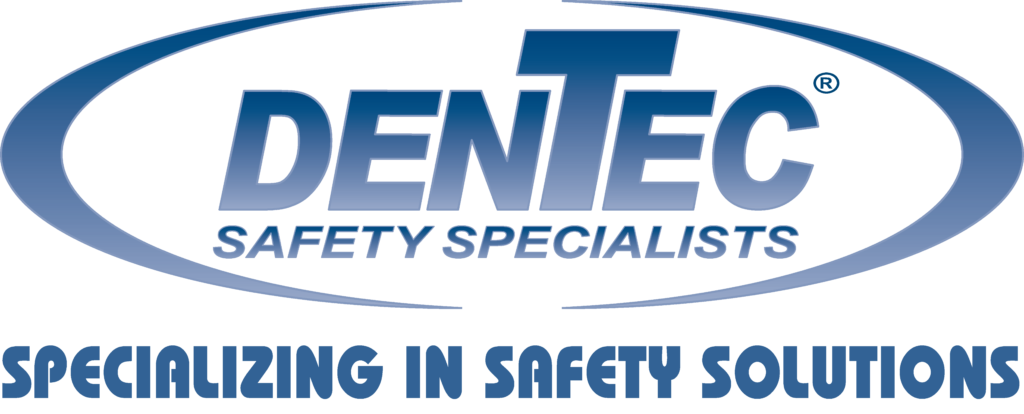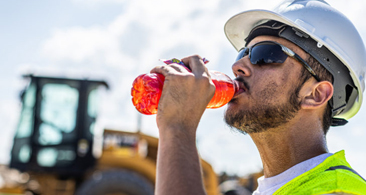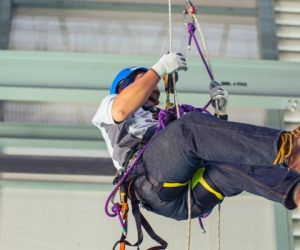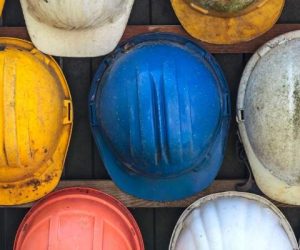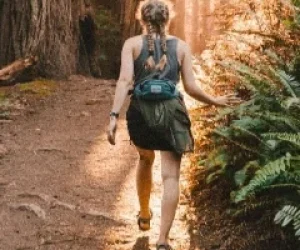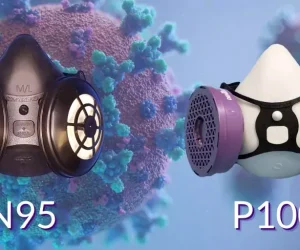It’s officially midsummer, and as much as most of us can’t wait for the warm summer months, August- September are typically hottest months of year in the Northern Hemisphere. We all love that Vitamin D and to sport a good tan, but it’s the combination of the seasonal heat and humidity in August and September that can be dangerous when participating in physical activity and working outdoors.
Outdoor work in the heat put’s stress on your bodies cooling system and if ignored, can lead to heart-related illness, disability and even death on the job.
Here are just some of the illnesses caused by Heat Stress:
- Fainting
- Heat Stroke
- Heat Exhaustion
- Heat Rash
- Heat Cramps
- Sunburn
According to Government of Ontario heat stress can get even worse when combined with:
- Physical work
- Loss of fluids
- Fatigue
- A pre-existing medical condition
Stay safe this summer and avoid heat induced illness with Dentec Safety’s proven 3 Ways to protect you and your employees from Heat Stress.
1. Hydrate, Hydrate, Hydrate
Hydration plays an important role in worker safety and productivity. Companies, safety directors and employees all want to work safely, perform productively, and return to work the next day. Everyone wants to avoid accidents and injury at all costs. HYDRATION IS 365! There is a balance the body needs year-round. Your body needs to have the right balance of water and energy to a great tasting, scientifically-formulated electrolyte replacement drink designed to restore important mineral salts and fluids lost through dehydration, physical exertion and heat stress. Sqwincher is more satisfying than water or soft drinks because the body absorbs it more quickly and it restores the body to its proper electrolyte and fluid balance needed to function properly. Sqwincher, the Activity Drink, is the natural recovery source for dehydration.
Sqwincher has served industrial workers since 1975. It’s the only electrolyte replacement drink specially created for the high heat-stress environment of the workplace. What’s more, Sqwincher has a solid track record of successes directed against heat stress among industrial workers. Make sure to make Sqwincher part of your hydration program that includes the proper consumption of water along with Sqwincher.
Sqwincher offers a wide variety of dispensing options, such Freeze Pops , liquid and powder concentrates and package sizes – plus several, great tasting flavors.
To learn which Sqwincher package and dispensing option will be most effective in your environment click here.
2. Keep Cool
We all know the feeling of being overheated and longing to plunge into a cold pool. Avoid daydreaming and stay focused on the task at hand by reproducing that feeling with cooling apparel. Keep your body temperature from overheating with protective apparel specifically designed for heat stress protection.
Protect your body from heat stress with Thermo-Cool. Thermo-Cool products are characterized by their ability to protect individuals against the disabling effects of intense heat. The Thermo-Cool fabric was developed as a unique composite material designed to absorb and trap water to provide cooling through the process of evaporation. Simply soak in cold water for 3 minutes, squeeze and wear. Keeping you cool for hours. When the Thermo-Cool protective apparel starts to warm up, simply soak it in cold water and use it over and over again.
Thermo-Cool products come in a variety of styles and applications included:
- Neck-Ties
- Bandanas
- Hard Hat Pads
- Cooling Vest
- Wrist Wrap
- Sweatbands
3. Shield Your Skin!
Workers face risks every workday when they operate heavy equipment in construction, work outside on electrical lines and work in construction trades among the many other outdoor work environments. Yet one of the most consistent and dangerous occupational exposures that threatens outdoor workers’ health goes largely unrecognized – the sun’s ultraviolet radiation (UVR).
Did you know?
- In 2021, approximately 8200 Canadians will be diagnosed with skin cancer
- The number of melanoma deaths is expected to increase by 4.8 percent in 2021
- Skin cancer is the 7th most diagnosed cancers in Canada
- The incidence of non-melanoma skin cancers has doubled in the past 20 years
- Melanoma accounts for 6% of new cancer cases in men and 5% of new cancers in women
- One in seven Canadians is expected to get skin cancer in his or her lifetime
- In 2020, an estimated 1300 Canadians died from Melanoma
Outdoor workers are 2.5 to 3.5 times more likely to be diagnosed with skin cancers! (Ontario Sun Safety Working Group).
So, what do you and your employees need to know to work safely under the sun?
Know your risk
Sun exposure at any age can cause skin cancer. You need to be especially careful if you have:
- Numerous moles, irregular moles or large moles
- Freckles, or burn before tanning
- Fair skin, blond, red or light brown hair
You also need to consider the amount and intensity of the UVR to which you are exposed daily. You need to be especially careful if you:
- Live or work at high altitude
- Spend a lot of time outdoors at midday or in the summer
Stop the burn
Reducing sunburn is the single most preventable risk factor for skin cancer. Short periods of intense sun exposure are associated with a two-fold increase in melanoma. Also, it’s possible to get sunburned on a cloudy day. Clouds block only 20-40 percent of UVR.
Take cover
Staying out of the sun whenever possible is the most foolproof way to protect yourself. If no shade is available, bring portable shade with you to a jobsite. If you work or rest in a vehicle, window glass blocks UVB but not all UVA.
Cover up
As much as 85 percent of UVR can reflect off sand, tile, cement and water, so shade cover may not be enough protection. Clothing can be an excellent sunscreen. Long-sleeved shirts with collars, long pants, shoes and socks provide more coverage than tank-tops, t-shirts, shorts and sandals. Fabrics with a tight weave between the threads block more UVR than loosely woven fabrics. Light-colored clothing feels cooler because it reflects infrared light (heat), but darker colors absorb harmful UVR better.
Wear a hat
More skin cancers occur on the head and face than any other place on the body. Tightly woven hats with a three-inch brim all the way around can help reduce sun exposure to the head, face and neck by as much as two-thirds.
Use sunscreen
Sunscreen is a valuable sun protection measure when used appropriately. Regular use of a broad-spectrum sunscreen is effective in preventing UVR-induced skin damage that may result in skin cancer. There are two major types of UVR that damage skin, UVB and UVA. All sunscreens protect against UVB, but only broad spectrum sunscreens protect against both UVB and UVA. To block UVA, look for avobenzone, oxybenzone, zinc oxide and titanium dioxide in the active ingredients. The active ingredients in sunscreen absorb, reflect or scatter the harmful rays of the sun.
Sunscreen provides protection for a limited amount of time; usually the number of minutes it normally takes your skin to redden multiplied by the SPF of the sunscreen.
The Solution: Ideally, a broad spectrum, high SPF (Sun Protection Factor) sunscreen should be used in addition to wearing sun protective clothing. Reapply sunscreen every two hours. The reapplication of sunscreen only keeps up the protection of the first application; it doesn’t give you extra or longer protection. The pouch-style container is a convenient solution as workers can take a few pouches with them on the job and apply sunscreen several times during the day. These have UVA and UVB protection with an SPF value of 30.
Dentec sunscreen offers protection against the health hazards associated with over exposure to the sun. Our formulation offers:
- Broad spectrum protection against UVA/UVB rays
- Water resistant and sweat resistant
- Dermatologist tested Hypoallergenic formulation
- Provides sunburn protection
- Paba free, Perfume Free
- Convenient packaging formats for all applications
Heat Stress & Sun Exposure are invisible hazards in the industry, so visit Dentecsafety.com or talk to one of our Safety Experts today to learn more on how you can prevent Heat Stress and keep yourself and your employees safe this August.
